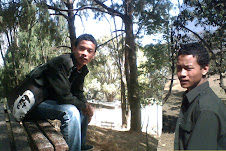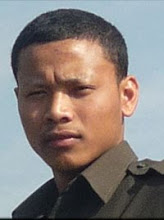When a runner sees the ribbon at finishing line he will try to run as fast as he can. & he had too.
Not only big project have problem a smaller have too. Bigger project have bigger problem smaller project have smaller problem, longer have many problem.
Man is not selfish he is made selfish by the civilization of society so it is needed to change the civilization: Green civilization.
A man had to claim on his own thing only then when he there is fear of claiming by other or other may take it. And he is not sure that is his.
Until the word is not spell out from a man then the word will be under his boundaries and as if his word spells out from him he will be under the boundaries of the word. – Socrates
If he is a innocent man. Claim on Socrates
Saturday, October 10, 2009
I, Che

I, Che Guevara
(2000)
A novel by
John Blackthorn
In Cuba, Castro has finally relinquished power. . . . now a mysterious exile (Che Guevara?) returns to finish the revolution.
When a strange man appears in rural towns around Cuba quietly advocating a new kind of politics he calls "the True Republic," old-timers begin to suspect that the elderly stranger, who calls himself Ernesto Blanco, may actually be the martyr Ernesto "Che" Guevara. Shortly after Blanco's appearance, Fidel Castro steps down from power in exchange for a commitment from the United States to recognize Cuba and lift the crippling embargo. Two traditional parties quickly form: one is a successor to the Communist Party and the other is composed of U.S. and Mafia-backed Cuban exiles. As the True Republic movement spreads like wildfire throughout Cuba, each faction devises a plot to get rid of Ernesto Blanco - by assassination if necessary
Motercycle diaries of Che

Special movie tie-in edition of Che Guevara's youthful travel diaries to coincide with the Fall release of Redford & Salles's film of the book. Says director Walter Salles: "If the film reaches a younger audience, I hope it will inspire people to read The Motorcycle Diaries, to have the impression that change can occur." "As his journey progresses, Guevara's voice seems to deepen, to darken, colored by what he witnesses in his travels. He is still poetic, but now he comments on what he sees, though still poetically, with a new awareness of the social and political ramifications of what's going on around him."-January Magazine "The Motorcycle Diaries could easily go on to become the first Spanish language nominee for Best Picture."-Roger Friedman, Fox N
Greem Thoughts

When a runner sees the ribbon at finishing line he will try to run as fast as he can. & he had too.
Not only big project have problem a smaller have too. Bigger project have bigger problem smaller project have smaller problem, longer have many problem.
Man is not selfish he is made selfish by the civilization of society so it is needed to change the civilization: Green civilization.
A man had to claim on his own thing only then when he there is fear of claiming by other or other may take it. And he is not sure that is his.
Until the word is not spell out from a man then the word will be under his boundaries and as if his word spells out from him he will be under the boundaries of the word. – Socrates
If he is a innocent man. Claim on Socrates
Che Guevara: killed in 9 oct by american CIA

Date of birth: June 14, 1928
Place of birth: Rosario, Argentina
Date of death: October 9, 1967 (aged 39)
Place of death: La Higuera, Bolivia
Major organizations: 26th of July Movement, United Party of the Cuban Socialist Revolution, National Liberation Army (Bolivia)
Religion: None
Ernesto "Che" Guevara (June 14, 1928 – October 9, 1967) commonly known as Che Guevara, El Che, or simply Che, was an Argentine Marxist revolutionary, politician, author, physician, military theorist, and paramilitary guerrilla leader. Since his death, his stylized image has become a ubiquitous global symbol of counterculture.
As a young medical student, Guevara traveled throughout Latin America and was transformed by the endemic poverty he witnessed. His experiences and observations during these trips led him to conclude that the region's ingrained economic inequalities were an intrinsic result of monopoly capitalism, neocolonialism, and imperialism, with the only remedy being world revolution. This belief prompted his involvement in Guatemala's social reforms under President Jacobo Arbenz Guzmán; whose eventual CIA-assisted overthrow solidified Guevara's radical ideology.
Later, in Mexico, he met Fidel Castro and joined his 26th of July Movement. In December 1956, he was among the revolutionaries who invaded Cuba under Castro's leadership with the intention of overthrowing U.S.-backed Cuban dictator Fulgencio Batista. Guevara soon rose to prominence among the insurgents, was promoted to Comandante, and played a pivotal role in the successful two year guerrilla campaign that deposed Batista. Following the Cuban revolution, Guevara reviewed the appeals of those convicted as war criminals during the revolutionary tribunals, ratifying sentences which in some cases involved execution by firing squad. Later he served as minister of industry and president of the national bank, before traversing the globe as a diplomat to meet an array of world leaders on behalf of Cuban socialism. Such diplomacy allowed him to play a key role in acquiring for Cuba the Soviet nuclear-armed ballistic missiles which precipitated the 1962 Cuban Missile Crisis. He was a prolific writer and diarist, composing a seminal manual on the theory and practice of guerrilla warfare, along with what later became a best-selling memoir about his motorcycle journey across South America. Guevara left Cuba in 1965 to incite revolutions first in an unsuccessful attempt in Congo-Kinshasa and later in Bolivia, where he was captured by Bolivian forces assisted by the CIA and executed.
Notorious as a ruthless disciplinarian who unhesitatingly shot defectors, yet revered by supporters for his rigid dedication to professed doctrines, Guevara remains a controversial and significant historical figure. As a result of his perceived martyrdom, poetic invocations for class struggle, and desire to create the consciousness of a "new man" driven by "moral" rather than "material" incentives, Guevara evolved into a quintessential icon of leftist-inspired movements. Ironically and in contradiction with his ideology, Che's visage was also reconstituted as a global marketing emblem and insignia within popular culture. He has been mostly venerated and occasionally reviled in a multitude of biographies, memoirs, books, essays, documentaries, songs, and films. Time magazine named him one of the 100 most influential people of the 20th century, while an Alberto Korda photograph of him entitled Guerrillero Heroico (shown), was declared "the most famous photograph in the world."
Motorcycle journey
Main articles: The Motorcycle Diaries and The Motorcycle Diaries (film)
In 1948, Guevara entered the University of Buenos Aires to study medicine. But in 1951, he took a year off from studies to embark on a trip traversing South America by motorcycle with his friend Alberto Granado, with the final goal of spending a few weeks volunteering at the San Pablo Leper colony in Peru, on the banks of the Amazon River. Guevara used notes taken during this trip to write an account entitled The Motorcycle Diaries, which later became a New York Times best-seller, and was adapted into a 2004 award-winning film of the same name.
By trip's end, he came to view Latin America not as collection of separate nations, but as a single entity requiring a continent-wide liberation strategy. His conception of a borderless, united Hispanic America haring a common 'Latino' heritage was a theme that prominently recurred during his later revolutionary activities. Upon returning to Argentina, he completed his studies and received his medical degree in June 1953, making him officially "Dr. Ernesto Guevara". Guevara later remarked that through his travels of Latin America, he came in "close contact with poverty, hunger and disease" along with the "inability to treat a child because of lack of money" and "stupefaction provoked by the continual hunger and punishment" that leads a father to "accept the loss of a son as an unimportant accident". It was these experiences which Guevara cites as convincing him that in order to "help these people", he needed to leave the realm of medicine, and consider the political arena of armed struggle.
Early life
A teenage Ernesto (left) with his parents and siblings, ca. 1944. Seated beside him, from left to right: Celia (mother), Celia (sister), Roberto, Juan Martin, Ernesto (father) and Ana Maria.
Ernesto Guevara was born to Celia de la Serna and Ernesto Guevara Lynch on June 14, 1928 in Rosario, Argentina, the eldest of five children in a family of Spanish, Basque and Irish descent. In lieu of his parents surnames, his legal name (Ernesto Guevara) will sometimes appear with de la Serna, or Lynch accompanying it. In reference to Che's "restless" nature, his father declared "the first thing to note is that in my son's veins flowed the blood of the Irish rebels." Growing up in a family with leftist leanings, Guevara was introduced to a wide spectrum of political perspectives even as a boy. His father, a staunch supporter of Republicans from the Spanish Civil War, often hosted many veterans from the conflict in the Guevara home.
Though suffering crippling bouts of acute asthma that were to afflict him throughout his life, he excelled as an athlete, enjoying swimming, soccer, and golf. He was an avid rugby union player and earned himself the nickname "Fuser"—a contraction of El Furibundo (raging) and his mother's surname, de la Serna—for his aggressive style of play. His schoolmates also nicknamed him "Chancho" ("pig"), because he rarely bathed, and proudly wore a "weekly shirt."
Guevara learned chess from his father and began participating in local tournaments by age 12. During adolescence and throughout his life he was passionate about poetry, especially that of Pablo Neruda, John Keats, Antonio Machado, Federico García Lorca, Gabriela Mistral, César Vallejo, and Walt Whitman. He could also recite Rudyard Kipling's "If" and José Hernández's "Martín Fierro" from memory. The Guevara home contained more than 3,000 books, which allowed Guevara to be an enthusiastic and eclectic reader, with interests including Karl Marx, William Faulkner, André Gide, Emilio Salgari and Jules Verne. Additionally, he enjoyed the works of Jawaharlal Nehru, Franz Kafka, Albert Camus, Vladimir Lenin, and Jean-Paul Sartre; as well as Anatole France, Friedrich Engels, H.G. Wells, and Robert Frost.
A 22-year-old Guevara in 1951
As he grew older, he developed an interest in the Latin American writers Horacio Quiroga, Ciro Alegría, Jorge Icaza, Rubén Darío, and Miguel Asturias. Many of these authors' ideas he would catalog in his own handwritten notebooks of concepts, definitions, and philosophies of influential intellectuals. These included composing analytical sketches of Buddha and Aristotle, along with examining Bertrand Russell on love and patriotism, Jack London on society, and Nietzsche on the idea of death. Sigmund Freud's ideas fascinated him as he quoted him on a variety of topics from dreams and libido to narcissism and the oedipus complex. His favorite subjects in school included philosophy, mathematics, engineering, political science, and sociology.
Years later, a February 13, 1958, declassified CIA 'biographical and personality report' would make note of Guevara’s wide range of academic interests and intellect, describing him as "quite well read" and offering the racist proclamation that "Che is fairly intellectual for a Latino".
Subscribe to:
Posts (Atom)





